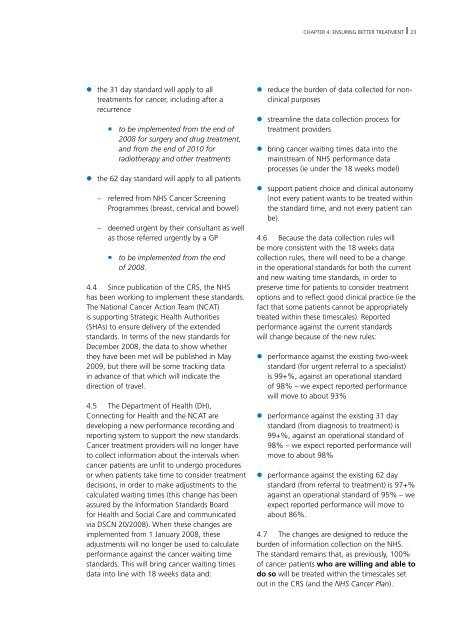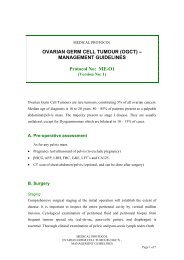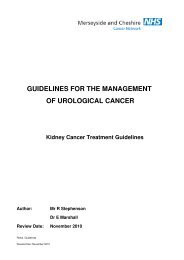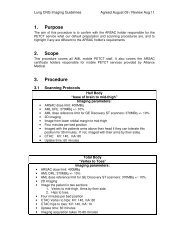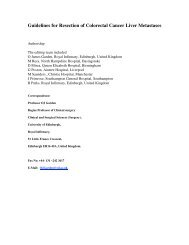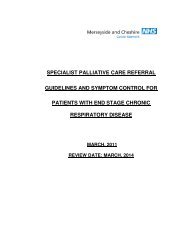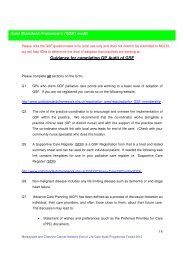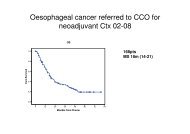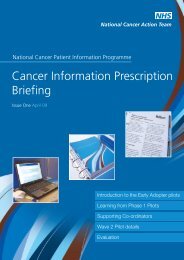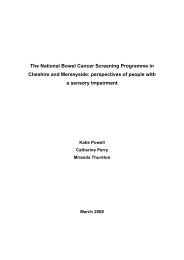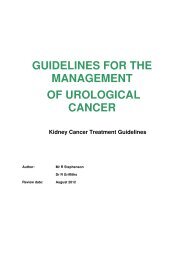Cancer Reform Strategy - First Annual Report - Merseyside ...
Cancer Reform Strategy - First Annual Report - Merseyside ...
Cancer Reform Strategy - First Annual Report - Merseyside ...
Create successful ePaper yourself
Turn your PDF publications into a flip-book with our unique Google optimized e-Paper software.
CHAPTER 4: ENSURINg BETTER TREATMENT23• the 31 day standard will apply to alltreatments for cancer, including after arecurrence• to be implemented from the end of2008 for surgery and drug treatment,and from the end of 2010 forradiotherapy and other treatments• the 62 day standard will apply to all patients− referred from NHS <strong>Cancer</strong> ScreeningProgrammes (breast, cervical and bowel)− deemed urgent by their consultant as wellas those referred urgently by a gP• to be implemented from the endof 2008.4.4 Since publication of the CRS, the NHShas been working to implement these standards.The National <strong>Cancer</strong> Action Team (NCAT)is supporting Strategic Health Authorities(SHAs) to ensure delivery of the extendedstandards. In terms of the new standards forDecember 2008, the data to show whetherthey have been met will be published in May2009, but there will be some tracking datain advance of that which will indicate thedirection of travel.4.5 The Department of Health (DH),Connecting for Health and the NCAT aredeveloping a new performance recording andreporting system to support the new standards.<strong>Cancer</strong> treatment providers will no longer haveto collect information about the intervals whencancer patients are unfit to undergo proceduresor when patients take time to consider treatmentdecisions, in order to make adjustments to thecalculated waiting times (this change has beenassured by the Information Standards Boardfor Health and Social Care and communicatedvia DSCN 20/2008). When these changes areimplemented from 1 January 2008, theseadjustments will no longer be used to calculateperformance against the cancer waiting timestandards. This will bring cancer waiting timesdata into line with 18 weeks data and:• reduce the burden of data collected for nonclinicalpurposes• streamline the data collection process fortreatment providers• bring cancer waiting times data into themainstream of NHS performance dataprocesses (ie under the 18 weeks model)• support patient choice and clinical autonomy(not every patient wants to be treated withinthe standard time, and not every patient canbe).4.6 Because the data collection rules willbe more consistent with the 18 weeks datacollection rules, there will need to be a changein the operational standards for both the currentand new waiting time standards, in order topreserve time for patients to consider treatmentoptions and to reflect good clinical practice (ie thefact that some patients cannot be appropriatelytreated within these timescales). <strong>Report</strong>edperformance against the current standardswill change because of the new rules:• performance against the existing two-weekstandard (for urgent referral to a specialist)is 99+%, against an operational standardof 98% – we expect reported performancewill move to about 93%• performance against the existing 31 daystandard (from diagnosis to treatment) is99+%, against an operational standard of98% – we expect reported performance willmove to about 98%• performance against the existing 62 daystandard (from referral to treatment) is 97+%against an operational standard of 95% – weexpect reported performance will move toabout 86%.4.7 The changes are designed to reduce theburden of information collection on the NHS.The standard remains that, as previously, 100%of cancer patients who are willing and able todo so will be treated within the timescales setout in the CRS (and the NHS <strong>Cancer</strong> Plan).


